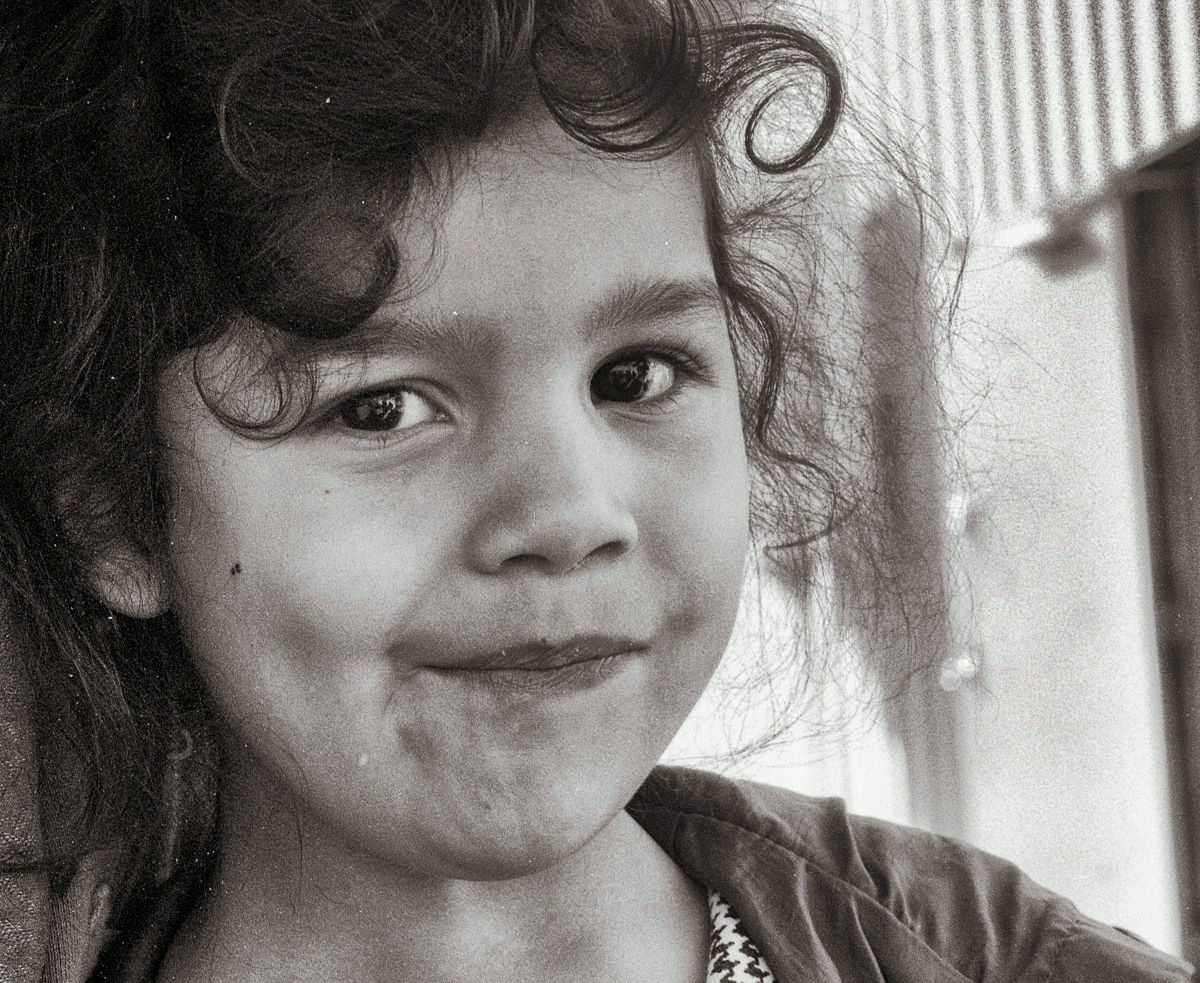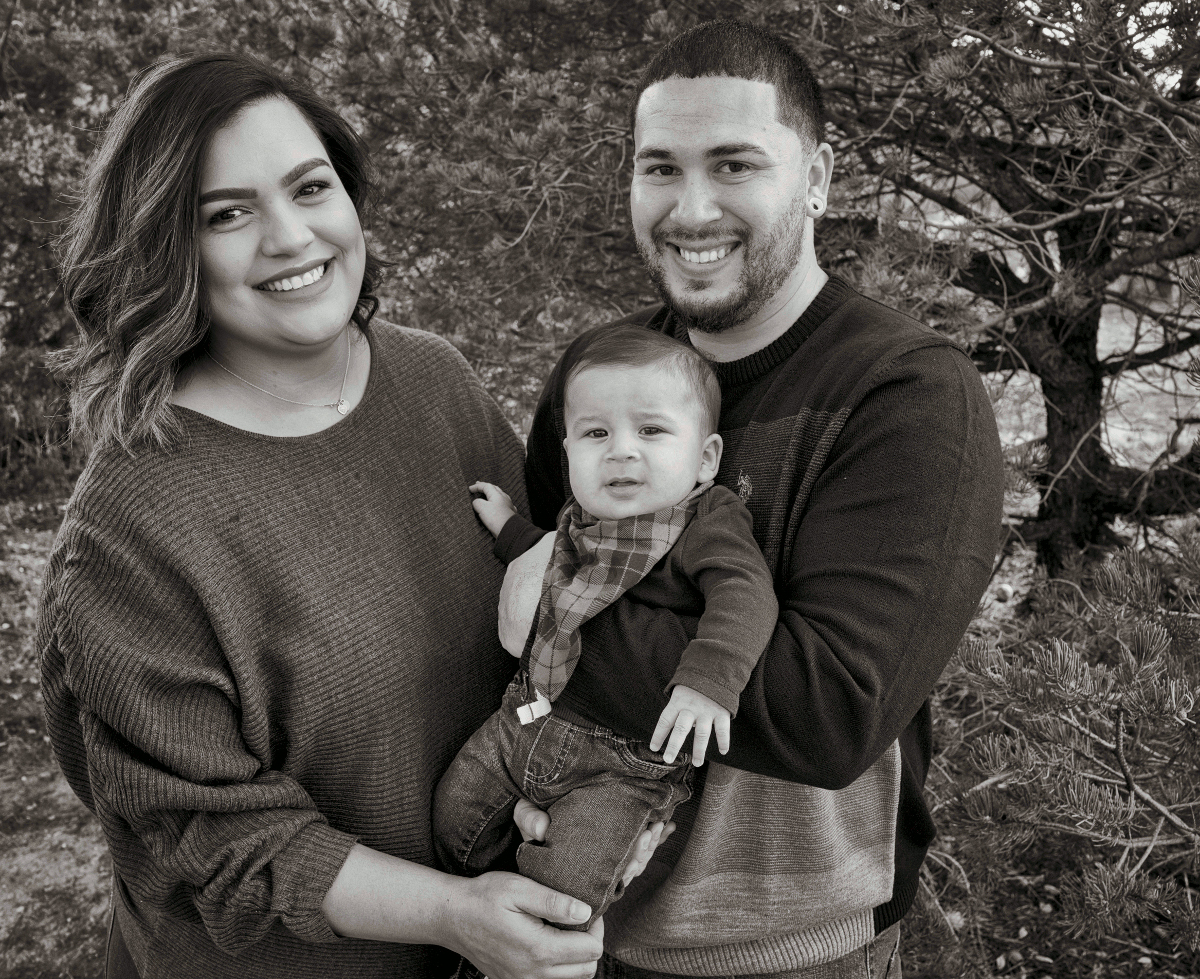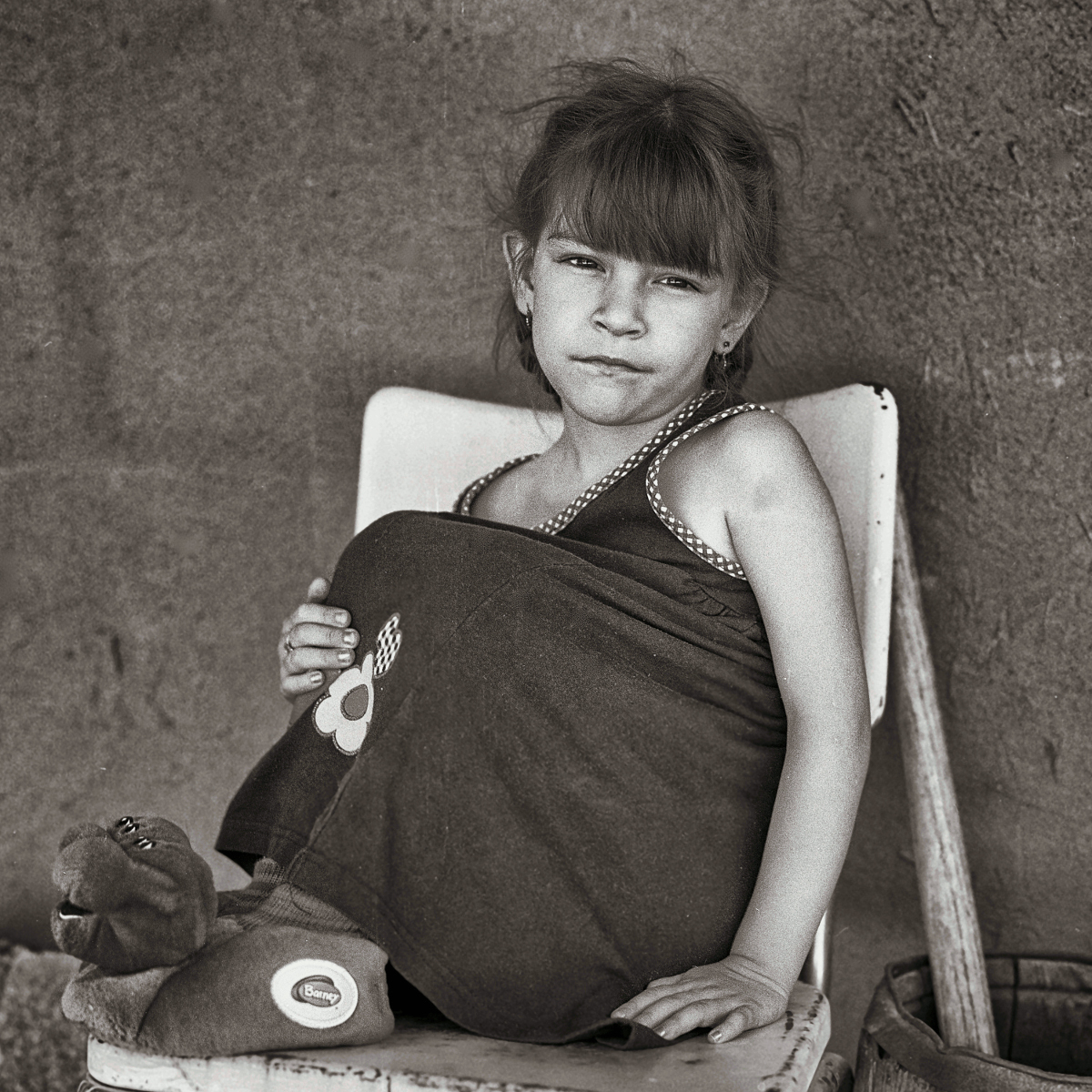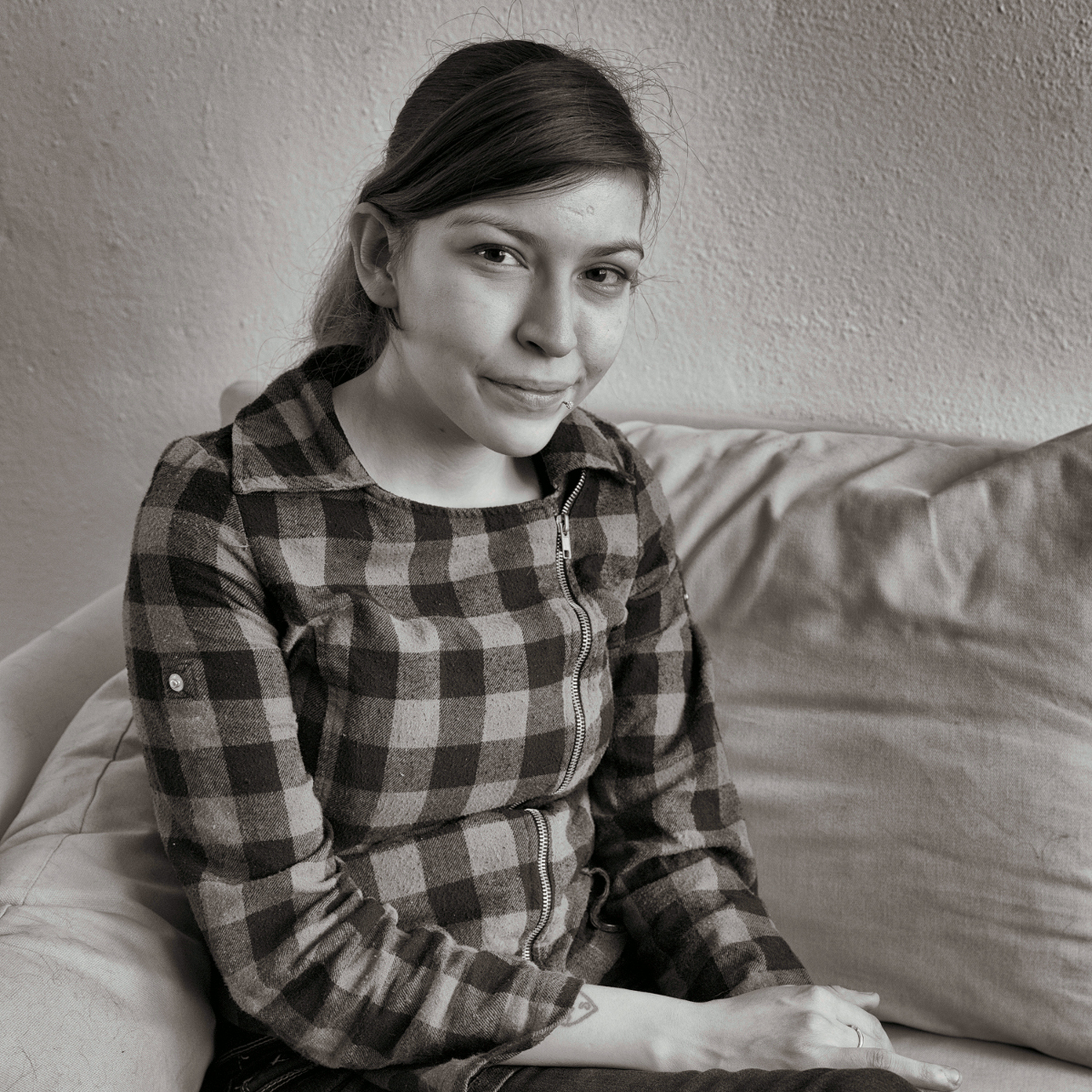Editor’s note: This article was first published on Searchlight New Mexico and has been republished with their permission. Minor style changes were made with permission.
As part of Searchlight’s Raising New Mexico project, photographer Don Usner
catches up with people he photographed decades ago, when they were children.
Here are their photos and stories.

Don Usner / Searchlight New Mexico
Author’s note: I first photographed Sophia Salazar in 1997, when she was attending Conjunto Preschool in Española, an early childhood education program that integrates children who have various challenges — developmental, cognitive, behavioral — with kids who are on a more typical trajectory. Sophia’s mother and grandmother both worked in the program.
Nearly two decades after taking Sophia’s photo, I recognized her name at a teller’s window in a bank in Albuquerque. Later, I arranged to interview and photograph her with her 6-month-old son, Ian, and husband, Isaac, in Santa Fe.

Don Usner / Searchlight New Mexico
I was born in Española, New Mexico, and went to Conjunto Preschool in Española when I was 3 and 4 years old, so over 20 years ago. I met you on a field trip — I can’t remember the details and I’m not going to pretend to — but that’s where you shot that candid photo, and now that’s what I see everywhere, because my grandmother still works at Conjunto, where the photo is on the wall. And my mom and grandma have the photo at home, too. So that’s what I’m associated with, the girl in the picture — the girl in the black-and-white photo.
After preschool, I went on to Los Niños Kindergarten [Center] in Española, and then Hernandez Elementary, Española Middle School, and then Española Valley High School. After I graduated, I went to Northern New Mexico College for a while, and then the University of New Mexico.
I started studying in education, but then I got into working for the financial industry and I decided that that was the route I would go instead. I now work for a small community bank in Albuquerque. I love Albuquerque, and I enjoy what I do.
The preschool program helped me in a lot of ways. As a child, I had trouble dealing with my anger. And so at 3 and 4 — that’s really when you’re learning to socialize — preschool helped me to understand how to deal with my feelings. Also, in that preschool there were some children with disabilities — some physical and some psychological or emotional. So I learned tools to interact with all types of children and get around day to day. I still use those tools now.
Growing up in Española, I didn’t know if it was different or harder or easier than anywhere else. But now, when I introduce myself to people and say I’m from Española, they say that I don’t sound like I’m from Española, or I don’t act like I’m from Española. Just being from Española seemed to label me, but I just grew up in that lovely place, with the beautiful people and the beautiful landscape. Looking back now, I do realize that Española is a rural, poor, high-crime community. Still, I think its reputation leaves out Española’s lovely people and the wonderful things that the community has to offer.
I took a lot for granted when I was a kid. Now that I have a child of my own, I see how hard it is to provide the best of everything for your child. I’m learning how hard it is to be a parent. And I think Española was a great place to grow up, because of what my family and community provided, and New Mexico is a great place for my husband and me to raise our family. All of New Mexico is beautiful, the culture is beautiful. There are things that we have here that you can’t get anywhere else. I’ve always been in love with it.
I also know that the more resources and tools that children have to succeed, from earlier on in life, the better chance they have. It’s kind of like, the better the college education, the better the chance of a successful career, statistically speaking. And starting even earlier than that, starting when they’re 3 or 4, however young you can, programs like preschool or any resource that kids can have early on to help them learn and improve their abilities for dealing with the real world, that is so important and helpful. So, I wish there was a preschool like my preschool in my community, and in every community.
Years after childhood immigration, she dreams of stability
BY DON USNER /RAISING NEW MEXICO/
“My name is Cinthia Yaneli Muñoz Fierro,” the young woman announces, introducing herself in the Mexican custom with all her given and family names.

“I was supposed to be born, as far as my parents’ plan, in El Paso,” she says. “That would have given me dual citizenship. But because my mom didn’t make it across in time, I was born in Juárez, Chihuahua. And right now, I am technically just an illegal immigrant; I don’t have U.S. citizenship whatsoever.”
Cinthia doesn’t remember crossing la frontera at age 3, but that twist of fate thrust her into a legal bind from which she hasn’t yet managed to extricate herself. And it wasn’t the only twist of fate to shape her life.
“When I was born, something happened, and I was born different,” she explains.
That something was cerebral palsy.
While it inflicted an awkward limp, bringing ridicule from classmates, the citizenship issue affected her adult choices as she got older.
I met Cinthia when her mother, Meli, was hired to help care for my grandmother, who was then 101 years old. We didn’t ask about their citizenship; we were just happy to find someone who was loving and able to help us.
The scrappy 3-year-old I met in 1999 — soon after her arrival in the U.S. — is part of a special class of undocumented immigrants, those who came to this country as children. Federal policy for a time offered these arrivals a path to citizenship. Today, however, their status is caught up in a political football game played out by powerful people thousands of miles away.
“I remember how happy my mother was when she told me that I could live with her in Chimayó when she worked taking care of Grandma Benigna,” Cinthia recalls, referring to my grandmother as if she were her own.
Those happy days didn’t last long. My grandmother passed. Meli moved to take care of an elderly man — then another, and another. Cinthia enrolled for a year at the preschool where my wife worked, but we eventually we lost track of her.
She and I recently reconnected on Facebook. She told me she and Meli had led a peripatetic existence since I last saw them.

Don Usner / Searchlight New Mexico
“I don’t even know how I ended up here,” Cinthia muses. “I just remember living with a bunch of different people — for a time with my brother and his entire family in this one little trailer. We all had to crowd with each other — all the kids had to sleep in one designated area and the adults in another — my brother, his wife, his kids, their cousin’s kids, or their cousin’s cousin’s kids …”
Her education paralleled her shifting home life. Each year, she attended a different elementary school, trying to make new friends and stay away from the bullies who browbeat her about her limp.
“I had a lot of struggles, and not just getting along with people, but explaining about my leg, because I would always get pointed out: ‘Why do you walk different?’” she says.
When her mother found a job in Pojoaque Valley, they moved yet again. It was Cinthia’s senior year of high school, and she began to excel and make friends; more importantly, she met a social worker who reviewed her educational history and determined she hadn’t been receiving required services. One of those was physical therapy.
She began visiting the University of New Mexico’s Carrie Tingley Hospital, where she was treated and her leg re-evaluated. Surgery eventually helped improve her mobility.
But once again, their peripatetic existence undermined her chances.
“They did help me out a lot in Pojoaque,” she says. “But I didn’t graduate there because things happened with my mom’s job again and we moved back to Santa Fe, and she didn’t have enough money to drive me to Pojoaque.”
Instead, she quit school and married Alex, her high school sweetheart. Two years later, they enrolled in an online learning program from which they graduated last summer.
“We actually managed to pull it off!” she declares triumphantly. “And I am the only one in the family who legitimately has a high school diploma.”
But the issue of her citizenship continues to loom large. Though she landed a good job with a cell phone company, she had to leave it once the manager made clear he would no longer tolerate undocumented people on his payroll.
“It has been kind of hard to find work, and I’ve been just babysitting. When I was little, I didn’t really think that not having citizenship would be a struggle, but now I’ve seen that if you don’t have a social security number, many places, even some hospitals and some doctors don’t want to see you. And most places won’t hire you.”
She and Alex were evicted from their home on Christmas Eve, but while neither one has solid work prospects, she remains optimistic – dreaming, she says, about eventual citizenship, steady work and stability.
Don J. Usner is a photographer for Searchlight New Mexico based in Las Cruces. He can be reached by email through searchlight@searchlightnm.com.